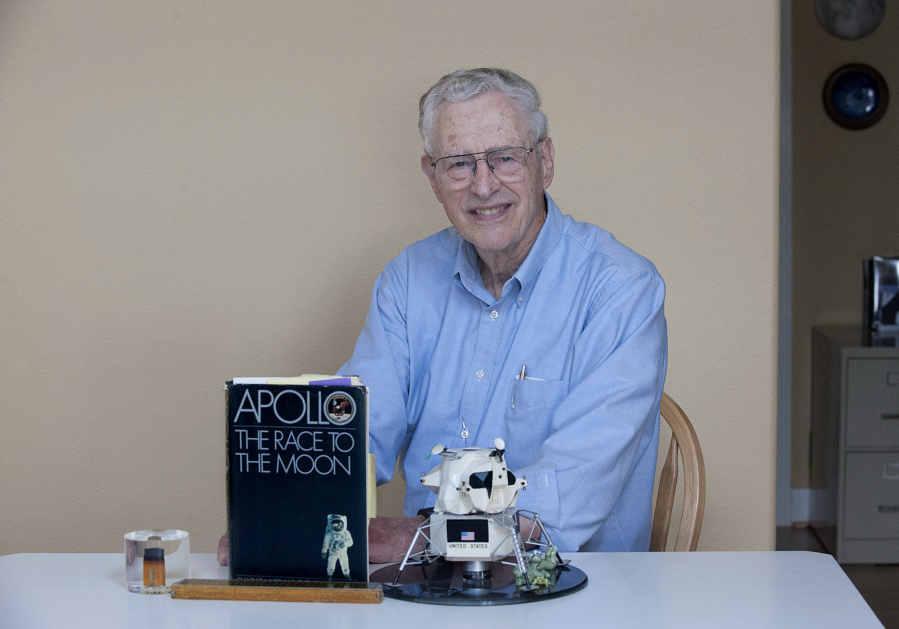Former NASA engineer Cline Frasier once offered this perspective on America’s manned spaceflight program:
“Waiting for perfection meant there would be no launches, ever.”
Eventually, a NASA launch yielded one of the signature quotes of the 20th century: “Houston, we have a problem.”
Despite falling short of perfection, Apollo 13 was called NASA’s most successful failure because a lot of really smart people, including the three astronauts, were able to work together to bring the crew back alive.
Frasier, now a Vancouver resident, was featured in The Columbian earlier this month after receiving the Alumni Achievement Award from the Washington State University Alumni Association.
Frasier was among the NASA employees recognized for helping that rescue effort. The movie “Apollo 13” did a nice job portraying the flight and how the engineering teams pulled together to solve tough problems, Frasier said.
The scene with Jim Lovell (played by Tom Hanks) and his wife outside in Houston in the evening was not as realistic: They would have been eaten alive by the salt marsh mosquitoes, Frasier said.
Not all of NASA’s challenges inspired Hollywood blockbusters. Apollo 14 was a classic example. On the way to the moon, there was a problem with clamps holding the lunar module to the command module.
Engineers from Grumman and North American Aviation worked together to find a fix. Then, in orbit around the moon, the computer in the lunar lander got an unexpected abort signal. Grumman engineers figured out that it was from a bad relay in the lander. A young engineer at Massachusetts Institute of Technology had less than 90 minutes to find a way to have the computer ignore the abort signal, test the fix and get new instructions to the astronauts.
A final problem popped up in the landing radar, and engineers decided to reboot it. All these fixes worked and the landing was successful.
Frasier dealt with a lot of lower-profile problems.
During final launchpad checkout of the unmanned Apollo 5 flight, a gyroscope indicated that it was starting to fail. Replacing it would delay the launch, and rooting around in the delicate instrumentation could introduce new problems. There was an intense debate about what was less risky — replacing the gyroscope or trusting it to last through the short unmanned mission. NASA and the engineers who designed and built the gyroscope recommended flying without changing. It didn’t fail.
A few hours before Apollo 12 launched, a computer keyboard inside the command module showed an “8” in every display location. Then the keyboard worked normally again. Was it safe to launch?
“We’d seen that in testing, about 4 1/2 years before,” Frasier said.
Called out of a space shuttle design meeting, he explained that it was due to a tiny piece of dirt in a display relay. Don Arabian, the NASA engineering support team leader, decided that replacing the keyboard was riskier than flying with it. There were no problems during the flight.
Apollo 12 also was struck by lightning shortly after launch, causing problems with the power supplies, telemetry and guidance system.
“We had to do a computer restart,” Frasier said. The next issue was, “Can we trust this stuff to get to the moon and back?” The people who designed, manufactured and tested the guidance system all looked into the data and their experience.
Their conclusion: They didn’t have any evidence that it was hurt by the lightning strike.
“It did fine.”
And on the topic of problems, there is an issue with that signature “Houston” quote. In Lovell’s account of Apollo 13, the mission commander quoted Jack Swigert as saying: “Houston, we’ve had a problem here.”
Just about everybody gets it wrong. But then, nobody’s perfect.
Off Beat lets members of The Columbian news team step back from our newspaper beats to write the story behind the story, fill in the story or just tell a story.




